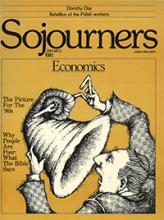Sojourners convened a forum on economics in the November 1980. Participants included Richard Barnet, a senior fellow and co-founder of the Institute for Policy Studies, author of several books including The Lean Years (Simon and Schuster, 1980) and Real Security: Restoring American Power in a Dangerous Decade (Simon and Schuster, 1981); Larry Rasmussen, professor of social ethics at Wesley Theological Seminary and author of Economic Anxiety and Christian Faith (Augsburg, 1981); Jeremy Rifkin, co-director of the Peoples Business Commission and author of Entropy: A New Worldview (Viking Press, 1980); and Robert Hamrin, an economist and senior staff member of the President's Commission for a National Agenda for the Eighties, author of Managing Growth in the 1980s: Toward a New Economics (Praeger, 1980). An excerpt from the conversation appears below.--The Editors
Sojourners: What are the principal economic realities confronting us in the '80s, and what are the root causes of unemployment, inflation, and recession?
Richard Barnet: The principal economic reality of the '80s is that we are in a slow-growth economy without the political or economic understanding to deal with it. Our present economic ideas and governmental tools are inherited from a unique moment in economic history, the two decades from 1950 to 1970, which was a period of rapid growth that is not likely to be repeated. We were not sufficiently conscious of the environmental and social costs of that growth; we saw only one side of the balance sheet and now we must deal with the consequences.
Read the Full Article

